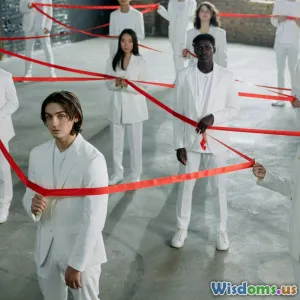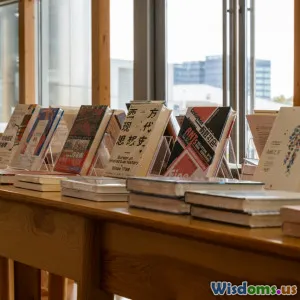
Do Literary Awards Reflect Modern Diversity Progress and Continuing Gaps
9 min read An in-depth exploration of how literary awards embody diversity strides and ongoing disparities in modern literature. (0 Reviews)
Do Literary Awards Reflect Modern Diversity Progress and Continuing Gaps?
The world of literature is not just a melting pot of ideas, stories, and emotions; it is a mirror reflecting societal values, dynamics, and transformations. Literary awards, in particular, serve as barometers of cultural recognition and achievement. But how well do these prestigious accolades reflect modern strides towards diversity? More importantly, do these prizes reveal continuing gaps in representation and inclusion? This article embarks on an in-depth investigation into these questions, seeking to uncover the nuanced relationship between literary honors and the evolving landscape of modern diversity.
Setting the Scene: Why Literary Awards Matter
Literary awards such as the Pulitzer Prize, Man Booker Prize, National Book Award, Hugo and Nebula Awards, and the women-specific Women’s Prize for Fiction influence the reading public, academic discussions, and publishing trends. Winners often surge in sales, become subject to critical acclaim, and set industry benchmarks. Hence, these awards do not just celebrate excellence—they shape cultural canons and collective memory.
The inclusivity embedded within these awards therefore carries heavy implications. When marginalized voices—from minorities, women, LGBTQ+ authors, and writers from diverse geographic locations—are acknowledged, it signals systemic progress and opportunities for broader narratives. Conversely, repetitive recognition of the same types of voices or overlooking certain communities exposes ongoing biases.
Progress Reflected in Literary Awards
Increasing Recognition of Diverse Voices
In recent decades, many literary awards have consciously expanded their embrace of diversity. Consider the Booker Prize, which since opening eligibility beyond the U.K. to all English-language authors, has spotlighted authors from South Asia, Africa, and the Caribbean:
- In 2001, Arundhati Roy, an Indian author, won the Booker for The God of Small Things, bringing postcolonial narratives into global view.
- The 2021 Booker shortlist included works by authors of Nigerian and Jamaican descent.
Similarly, the Pulitzer Prize for Fiction has recognized authors from underrepresented groups such as Toni Morrison, Jhumpa Lahiri, and Jesmyn Ward—whose novels eloquently depict African American experiences and immigrant perspectives.
Awards Dedicated to Marginalized Groups
Emergent recognitions like the Lambda Literary Awards (Lammys) specifically honor LGBTQ+ literature, increasing visibility and support for queer voices that mainstream awards have historically overlooked. The Hurston/Wright Legacy Award celebrates Black writers globally.
Such awards provide targeted platforms, encouraging more inclusive storytelling and validating diverse experiences.
Statistical Upturns in Diversity Metrics
A 2020 study by Lee & Low Books analyzing major U.S. literary prizes demonstrated a rise from barely 7% of winners being authors of color in the 1980s to surpassing 25% by the 2010s. While not perfect, this upward trend illustrates gradual improvement.
Continuing Gaps and Persistent Challenges
Underrepresentation and Homogeneity of Judges
Despite progress, diversity gaps remain pronounced. Studies reveal that judging panels for many major awards often lack racial, ethnic, and cultural diversity, influencing which narratives are spotlighted. For example, the National Book Awards have faced criticism for their predominantly white judging committees, impacting selection biases.
Missing Intersectionality
Authors who embody multiple marginalized identities frequently face compounded invisibility. Women's voices, while increasingly awarded, still often see disparity in recognition when intersecting with race or sexuality. According to VIDA: Women in Literary Arts’ annual surveys, works by women of color receive disproportionately low critical attention compared to those by white women or men.
Language and Geographic Biases
English-language literary awards frequently disregard outstanding literature in other languages. Even in translated works, disparate investment and visibility obstruct equal recognition. While initiatives like the International Booker Prize try to bridge this gap, many rich literary traditions remain underacknowledged on global platforms.
Controversies and Tokenism
Recent controversies highlight that simply awarding diverse authors is insufficient if systemic change in publishing and literary criticism does not accompany it. Amidst demands for inclusiveness, accusations of tokenism have emerged, where diversity awards are seen primarily as public relations tools rather than genuine shifts.
Case Studies Illuminating the Landscape
The Booker Prize and Diversity Debates
In 2019, the Booker Prize shortlist was noted for gender imbalance and the absence of Black authors, sparking public debates. The controversy prompted organizers to consider reforms, including efforts to diversify judges and spotlight genre fiction, often overlooked yet popular with minority authors.
The Pulitzer and the Exile of Minority Writers
Jesmyn Ward, a two-time Pulitzer winner, has critiqued the prize’s limited engagement with voices from the rural American South’s Black communities despite their cultural richness, underscoring gaps between award visibility and societal realities.
Genre Awards and Inclusion
Science fiction and fantasy awards like the Hugo and Nebula have increasingly faced calls to expand inclusivity beyond established Western, male-centric archetypes. The 2015 upheaval surrounding the #GamerGate-driven “Sad Puppies” campaign, which aimed to dominate nominations with conservative voices, demonstrated both cultural contestation and the necessity for vigilance in preserving diversity.
The Role of Publishers and Literary Critics
Awards reflect what publishers submit and what critics champion. Publishers historically underinvest in authors from marginalized communities, limiting award candidates’ pool. Even as some diversify their rosters, gatekeeping practices persist. Literary critics have a responsibility to pioneer more inclusive discourse, amplifying non-mainstream narratives.
Looking Forward: Building Equity in Literary Honors
To more accurately reflect modern diversity and address continuing gaps, the literary world could embrace several strategies:
- Diversify Judging Panels: Intentionally curating diverse, culturally competent juries can broaden perspectives and fair evaluation.
- Expand Eligibility and Submission Policies: Linguistic, regional, and genre restrictions should be reassessed to include a wider array of voices.
- Transparency and Accountability: Publish detailed demographics on nominees, judges, and winners to foster public accountability.
- Support for Emerging and Marginalized Authors: Investment in mentorship, grants, and promotion helps diversify future award nominees.
Conclusion: Reflecting Society’s Complex Stories
Literary awards do reflect some significant progress towards diversity, as evidenced by landmark winners, growing numbers of marginalized voices, and emergence of dedicated diversity awards. Yet, they simultaneously expose systemic deficits in truly equitable representation—from judging biases to publishing practices and cultural perceptions.
Readers, authors, and industry stakeholders must recognize that awarding diversity is part of a broader ecosystem demanding sustained commitment. Only by addressing underlying structural barriers can literary awards fulfill their potential as genuine mirrors and shapers of a vibrant, inclusive literary culture.
By understanding both achievements and persistent gaps, we can continue championing stories that not only illuminate our world but also celebrate its beautifully diverse voices.
References and further reading:
- Lee & Low Books Diversity Statistics Report (2020)
- VIDA: Women in Literary Arts Annual Report
- Booker Prize archives and submission guidelines
- Jesmyn Ward interviews and essays on literary inclusion
- Lambda Literary Awards history and impact
Rate the Post
User Reviews
Popular Posts

















